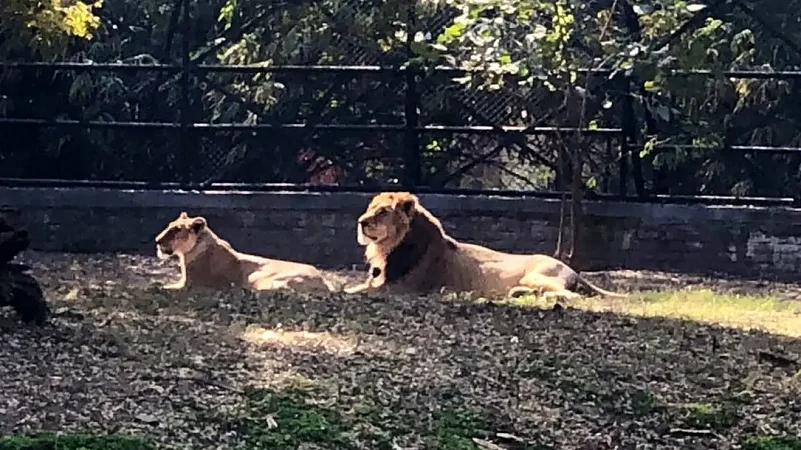Union Agriculture Minister Narendra Singh Tomar launched India's first Covid-19 vaccine for animals 'Ancovax' earlier this week, developed by Haryana-based ICAR-National Research Centre on Equines.
Ancovax is an inactivated vaccine that protects against Delta and Omicron variants of SARS-CoV-2, the virus that causes Covid-19 disease.
Besides India, Russia in April last year said it had developed a coronavirus vaccine for animals. It said in May 2021 that animals were being vaccinated at several places in the country.
Here we explain the development of India's first vaccine for animals, how such a need was felt, and how Covid-19 affects animals.
The development, features of Ancovax
India's first Covid-19 vaccine for animals Ancovax was tested on domestic and stray canines besides wild and laboratory animals. It can be administered to dogs, lions, leopards, mice, and rabbits.
The Times of India quoted ICAR Director General Dr Trilochan Mohapatra as saying, "The vaccine was tested on army, pet and stray canines in various cities in India as well as in wild and laboratory animals. It was found to be safe and did not have any side-effects."
He added that ICAR is looking for a private partnership to produce Ancovax doses at scale.
He further said that while the vaccine has been developed and has been launched, necessary approvals are still needed to make it available to end users.
The ICAR has recommended that Ancovax should be first administered in zoos and national parks.
The need for animal Covid jab
The risk to animals, particularly those of endangered species, led to the need for the development of a Covid-19 vaccine for animals.
Dr Bhupendra Nath Tripathi, Deputy Director-General (Animal Science), ICAR, said 16 lions and one leopard in Indian zoos have been infected with Covid-19 and most of them died.
This is the reason why they are recommending that these vaccines should be first administered in zoos and national parks.
He said, "Since more severe incidence of Covid has been reported in zoo animals, the initial doses could be given to animals like leopards, tigers and lions in such establishments when Covid cases begin surging there."
Moreover, there is evidence that the virus has been spreading from humans to their pet animals, which could also be checked by this vaccine.
The ToI reported, "ICAR recently tested over 1,500 canine serum samples from pets and stray dogs in India, and 30-42% of them had Covid antibodies, indicating virus spread from humans to animals."
The vaccine would also be crucial in the opposite case where the virus might be transmitted to humans via pet animals, the risk of which is said to be lower.
ICAR scientist Dr Jyoti Misri said, "The vaccine can protect animals in the zoo. It can also prevent transmission from companion animals to the humans."
The significance of inactivated vaccine
There are various kinds of vaccines such as live-attenuated vaccines (which use a weakened virus), viralvector vaccines (which use a virus as a medium to give genetic code to immune system to trigger it), etc. Ancovax is an inactivated virus vaccine, which means that it uses a virus that has been "killed" (inactivated) by heating, using radiation or some chemical.
The Indian Express reported that this approach has been taken for animals' vaccine for safety purposes.
"We avoid live vaccine in wild animals. This is because a live vaccine might have been attenuated for one particular species [such as humans], but it can still cause disease in another," said Dr AB Shrivastav, former director, School of Wildlife Forensic and Heath, Jabalpur, as per The Express.
Giving an example from Africa, he said, "Some 15 or 20 years back, a rabies vaccine developed for dogs was given to wolves in Africa and unfortunately the entire pack died. A killed virus vaccine will not harm the animals."
Testing kits also developed
Union Agriculture Minister Narendra Singh Tomar also launched two animal testing kits.
Tomar launched the 'CAN-CoV-2 ELISA kit' for antibody detection against coronavirus in canines.
"There are no laboratory animals required for the preparation of the antigens. The kit is made in India and a patent has been filed for the same. No other comparable kits for detection of antibodies in canines are available in the market," said the ICAR, as per PTI.
Surra ELISA kit, which detects infection in multiple animal species, was also launched. The ICAR noted that Surra is one of the most important haemoprotozoan diseases of the different livestock, which is prevalent in all the agro-climatic parts of India. In India, losses to livestock productivity were estimated to be Rs 44,740 million annually due to Surra, the ICAR noted.
An Equine DNA parentage testing kit, which is a powerful genomic technology for parentage analysis among horses, reported PTI.
Besides these products, more research is being conducted on animals.
ICAR's Dr Tripathi told ToI, "ICAR’s research is under way to develop newer anti-Covid vaccines for animals based on different vaccine platforms such as viral vector and mRNA.
"More precise studies on animal-to-animal Covid transmission and possible animal-to-human transmission are being undertaken by ICAR. It will be interesting to know if the virus mutates in the animal population."






















